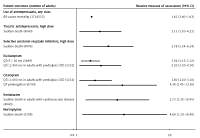Current issue
Archive
Manuscripts accepted
About the Journal
Editorial office
Editorial board
Section Editors
Abstracting and indexing
Subscription
Contact
Ethical standards and procedures
Most read articles
Instructions for authors
Article Processing Charge (APC)
Regulations of paying article processing charge (APC)
ARRHYTHMIAS / SYSTEMATIC REVIEW/META-ANALYSIS
Effects of antidepressants on QT interval in people with mental disorders
1
Department of Medicine and Cardiology Research, Westchester Medical Center and New York Medical College, New York, USA
2
Elsevier, Clinical Solutions, Philadelphia, USA
Submission date: 2018-02-27
Final revision date: 2018-04-10
Acceptance date: 2018-04-23
Online publication date: 2020-05-29
Publication date: 2020-05-26
Arch Med Sci 2020;16(4):727-741
KEYWORDS
TOPICS
ABSTRACT
Introduction:
Drug-induced QT prolongation is associated with higher cardiovascular mortality.
Material and methods:
We conducted a protocol-based comprehensive review of antidepressant-induced QT prolongation in people with mental disorders.
Results:
Based on findings from 47 published randomized controlled trials (RCTs), 3 unpublished RCTs, 14 observational studies, 662 case reports of torsades de pointes, and 168 cases of QT prolongation, we conclude that all antidepressants should be used only with licensed doses, and that all patients receiving antidepressants require monitoring of QT prolongation and clinical symptoms of cardiac arrhythmias. Large observational studies suggest increased mortality associated with all antidepressants (RR = 1.62, 95% CI: 1.60–1.63, number of adults: 1,716,552), high doses of tricyclic antidepressants (OR = 2.11, 85% CI 1.10–4.22), selective serotonin reuptake inhibitors (OR = 2.78, 95% CI: 1.24–6.24), venlafaxine (OR = 3.73, 95% CI: 1.33–10.45, number of adults: 4,040), and nortriptyline (OR = 4.60, 95% CI: 1.20–18.40, number of adults: 5,298).
Conclusions:
Evidence regarding the risk of QT prolongation in children is sparse.
Drug-induced QT prolongation is associated with higher cardiovascular mortality.
Material and methods:
We conducted a protocol-based comprehensive review of antidepressant-induced QT prolongation in people with mental disorders.
Results:
Based on findings from 47 published randomized controlled trials (RCTs), 3 unpublished RCTs, 14 observational studies, 662 case reports of torsades de pointes, and 168 cases of QT prolongation, we conclude that all antidepressants should be used only with licensed doses, and that all patients receiving antidepressants require monitoring of QT prolongation and clinical symptoms of cardiac arrhythmias. Large observational studies suggest increased mortality associated with all antidepressants (RR = 1.62, 95% CI: 1.60–1.63, number of adults: 1,716,552), high doses of tricyclic antidepressants (OR = 2.11, 85% CI 1.10–4.22), selective serotonin reuptake inhibitors (OR = 2.78, 95% CI: 1.24–6.24), venlafaxine (OR = 3.73, 95% CI: 1.33–10.45, number of adults: 4,040), and nortriptyline (OR = 4.60, 95% CI: 1.20–18.40, number of adults: 5,298).
Conclusions:
Evidence regarding the risk of QT prolongation in children is sparse.
Share
RELATED ARTICLE
We process personal data collected when visiting the website. The function of obtaining information about users and their behavior is carried out by voluntarily entered information in forms and saving cookies in end devices. Data, including cookies, are used to provide services, improve the user experience and to analyze the traffic in accordance with the Privacy policy. Data are also collected and processed by Google Analytics tool (more).
You can change cookies settings in your browser. Restricted use of cookies in the browser configuration may affect some functionalities of the website.
You can change cookies settings in your browser. Restricted use of cookies in the browser configuration may affect some functionalities of the website.



